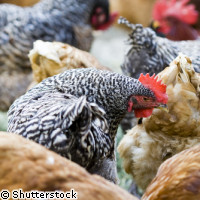Experts call for increased efforts to tackle emerging zoonotic infections
Zoonoses, diseases that are transmitted between vertebrate animals and humans, are on the rise, according to the latest report of the European Academies of Science Advisory Council (EASAC). To tackle the problem, the report calls for greater efforts to fill the gaps in research on these infections, as well as better surveillance mechanisms and increased international cooperation. A zoonotic agent may be a bacterium, virus, fungus, parasite, or other communicable agent. Many of these are food borne and carried by domestic livestock, such as salmonella. More than 1,400 species of infectious agents are known to be pathogenic for humans, and approximately 60% of these are zoonotic. Most 'new' human pathogens reported in the past 25 years have zoonotic origins, and the risk of infection is predicted to continue to increase due to changes to the global climate and our environment, and increased migration and mobility. Valuable progress has already been made at European level in tackling emerging zoonoses, but there is considerable room for improvement, says the EASAC. The surveillance of zoonoses is one area which requires continuing attention, according to the report. Important developments in this area have been the introduction of an EU-wide early warning system, the work of European Centre for Disease Prevention and Control (ECDC) in defining datasets on the diseases, and the European Food Safety Authority (EFSA)'s reporting on food-borne outbreaks of disease. The report suggests that emphasis should now be placed on improving the standardisation of data collection and data mining, as well as formulating new methods to monitor zoonotic agents in wild animals and livestock. It also calls for increasing the linkages between the ECDC and EFSA to ensure that information about food-borne zoonoses is rapidly communicated. Furthermore, the European Commission and Parliament should step up their support for international initiatives such as the Global Early Warning System, and give greater attention to these diseases and their impact on policy areas such as migration and health. On research, the EASAC notes that greater efforts are needed at EU level to address major gaps on vector-borne zoonoses, in particular, in vector biology, distribution and evolution and zoonoses transmitted by contact with wildlife. 'Although we appreciate that the European Commission hears many concerns from across the research community about lack of funding, there does appear to be a real insufficiency of investment in investigator-led basic research in infectious diseases (with the important exception of influenza). There is an opportunity to do better in understanding mechanisms of interspecies transmission, host adaptation and pathogenicity, including the molecular determinants of host specificity,' write the authors of the report. To mobilise financial resources in support of research excellence, the report recommends that policymaking should focus on stimulating the environment to encourage investment in new diagnostic products, for example a diagnostic chip with broad virology coverage. Increased support also needs to be given to the Global Animal Health Technology Platform and the Innovative Medicines Joint Technology Initiative to encourage participation by all stakeholder groups in focusing on disease priorities.



